A ban on factory-farmed meats is a conversation that's gaining momentum, especially in the United States. It is driven by a growing awareness of the immense scale and harm associated with intensive animal agriculture.
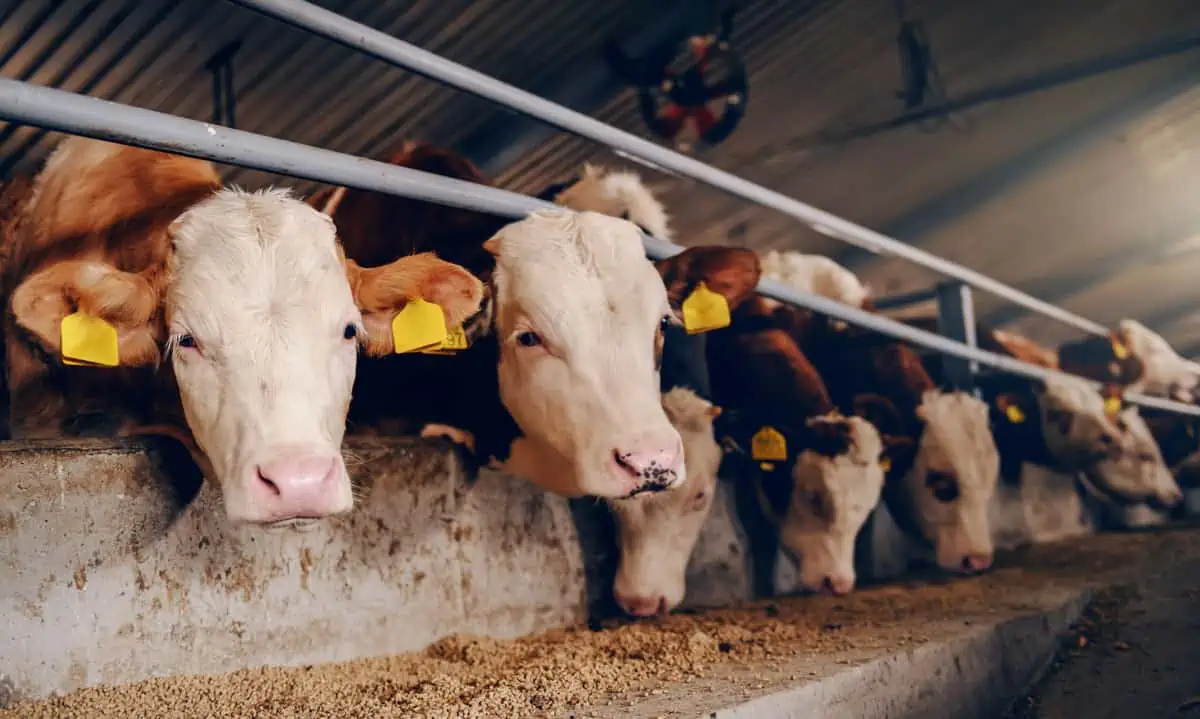
Many of us have traditional food memories intertwined with meat, dairy, and eggs, making transitioning to plant-based foods daunting. However, consumers are becoming increasingly aware of the cruelty of industrial farming on animals, workers, and the environment. This makes banning factory-farm meat and transitioning away from animal products in our diets a more viable choice.
It's empowering to know that with our purchasing power, we can end needless animal suffering by reducing our meat intake and making better choices at the grocery store and dining out. A good way to start is with our Guide to Ban Factory-Farm Meat From Your Diet!
Jump to:
Background on Factory Farming
Factory farming, originating in the mid-19th century, emerged as individuals and groups vied for profits by producing and selling affordable food in large volumes for national distribution. Through those years, meat production has become a very profitable and powerful part of our food industry. The rise of factory farming altered family farm dynamics, replacing humane pasture-raising practices. Detachment from food sources increased desensitization to the treatment of animals.

Population growth and rising meat demand have exacerbated the decline in the agricultural industry's farming methods. Animals in factory farms endure cramped conditions in concentrated animal feeding operations (CAFOs) and are often deprived of access to fresh air.
Factory farming dominates the agricultural industry, with 99 percent of farmed animals in the U.S. raised in around 250,000 factory farms.
Approximately two-thirds of all beef cattle in the U.S. are injected with a growth hormone, and 22 percent of dairy cows are given growth hormones to produce more milk. Cows are impregnated only to have their just-born calves swiftly taken away. Then, female dairy cows begin the process of milk production for human needs. Male cows are deemed useless to the dairy farm and are usually discarded.

In recent years, the U.S. Department of Agriculture has been challenged to improve standards on these industrial farms as the average consumer becomes more educated about the poor conditions. More and more of us are demanding an end to the cruelty within our food system. There is hope for change with affordable alternatives and a rise in animal activism that brings attention to these horrific practices within the meat industry.

Every day, 23 million land animals are killed on factory farms - that's around 266 EVERY SECOND!
Guide to Ethical and Sustainable Meat
The good news is that you no longer have to rely on conventional meat from grocery stores in your diet. Grass-fed meat, pasture-raised chickens, and the best egg farms are accessible through online stores, farmers' markets, and ethical butcher stores. Knowing the differences between certified organic, cruelty-free, ethical, and sustainable meat is important.
Meat Terminology
Certified Organic Meat:
- Raised without synthetic pesticides or chemical fertilizers.
- Animals are given organic feed, free from genetically modified organisms (GMOs).
- No antibiotics or synthetic growth hormones are administered.
- Organic farming practices promote soil health and biodiversity.
Cruelty-Free Meat:
- Animals are raised and slaughtered in humane conditions.
- Avoids overcrowding, confinement, and excessive use of antibiotics.
- Emphasizes the ethical treatment of animals throughout their lives.
- Supports animal welfare standards and practices.
Ethical Meat:
- Emphasizes ethical treatment of animals throughout their lives.
- Focuses on ensuring animals have a good quality of life.
- Involves practices like pasture-raising, providing access to outdoor spaces, and avoiding stressful environments.
- Ethical meat production seeks to minimize harm to animals.
Sustainable Meat:
- Minimizes the environmental impact of meat production.
- Focuses on responsible land and resource management.
- Promotes practices that reduce greenhouse gas emissions.
- Prioritizes efficient water usage and reduces pollution.
- Aims to maintain ecological balance and biodiversity.
Each of these terms reflects different aspects of responsible and conscientious meat production, addressing environmental, ethical, and health considerations. Therefore, Consumers can choose products that align with their values when buying meat by looking for these certifications.
Top 10 Tips When Buying Humanely Raised Meat
It's important to be mindful of our meat and its source. By banning factory-farmed meats from our diet, we can support sustainable and responsible practices that prioritize the well-being of animals. It's worth taking the time to consider various factors, such as the living conditions and treatment of the animals, before deciding. With a little research utilizing these tips, you can make a difference.
- Understand Labels and Certifications: Research and familiarize yourself with labels and certifications related to ethical meat production, such as organic, grass-fed, pasture-raised, and animal welfare certifications.
- Buy Locally Sourced Meat: Support local farmers and ranchers by prioritizing ethical and sustainable meat production.
- Look for Animal Welfare Standards: Choose meat from producers or brands prioritizing high animal welfare standards.
- Opt for Pasture-Raised or Grass-Fed: Select meat products labeled as "pasture-raised" or "grass-fed" since these methods are typically more ethically raised than factory farming.
- Consider Organic Options: Organic meat is often raised with strict standards regarding feed, antibiotics, and synthetic hormones.
- Research Sustainable and Regenerative Farming Practices: Investigate the farming methods employed by meat producers to ensure they prioritize sustainability.
- Support Ethical Slaughter and Processing: Find out if the meat producer follows humane and ethical practices during the slaughter and processing of animals.
- Ask Questions and Seek Transparency: Don't hesitate to ask questions about the meat's source, production methods, and animal welfare practices when buying from farmers' markets or local butchers.
- Consider Alternative Protein Sources. Explore plant-based protein options or cultured meat alternatives as ethical alternatives to traditional meat products.
- Support Advocacy and Policy Changes: Engage with organizations and initiatives that advocate for improved animal welfare and ethical farming practices.
While ethical meat may be more expensive, prioritize making choices that align with your values and budget. Consider reducing meat consumption and focusing on quality over quantity.
What to Look for When Reading Labels
Labels such as "grass-fed," "pasture-raised," and "free range" don't always ensure that the meat comes from ethical and sustainable sources. According to Consumer Reports, to be certain the meat you buy comes from humanely raised animals, look for the Animal Welfare Approved Seal, a GAP (Global Animal Partner) 1-5+ label, or the Certified Humane Seal. The USDA Organic Seal has some animal welfare standards, such as adequate space, but not to the same degree as other animal welfare labels. Please familiarize yourself with these labels before shopping and save images of them in your phone for referral.

Researching and looking for credible certifications and labels when buying meat products is important. Some labels may be confusing or unclear, so it is crucial to know what each label means and how it relates to animal welfare. It's always better to be safe than sorry and make informed choices to support responsible and ethical farming practices. Farm Foward shares an animal product label guide to help you understand meat labels and choose properly.
Mentionable Meat Companies & Guides
Finding food companies to support a ban on factory-farmed meats means looking for those committed to humane and sustainable farming practices.
U.S. Food Companies that avoid using Factory Farmed Meats
Here are some notable examples from various sources:
- Certified Humane Companies:
- Applegate: Offers products like Applegate NaturalsTM Frittata Bites.
- Apricot Lane Farms: Provides pasture-raised eggs, beef cuts, lamb cuts, and lamb offal.
- Ayrshire Farm: Offers beef, chicken, eggs, veal, turkey, and pork products.
- Cooks Venture Poultry: Specializes in pasture-raised whole chickens, chicken parts, and ground chicken.
- Creekstone Farms Premium Beef, LLC: Known for their natural Black Angus beef.
- D’Artagnan, LLC: Provides Green Circle Chicken and Turkey, both free-range and humanely raised.
- Firefly Farms: Offers pork, sausage, beef, veal, turkey, and chicken.
- Home Place Pastures: Focuses on pasture-raised pork and grass-fed beef.
- Regenerative Farms:
- Primal Pastures: This is a regenerative organic farm that offers 100% organic, pasture-raised, corn-free, and soy-free meats. They deliver nationwide and strongly focus on sustainable, ethical farming practices.
- Rep Provisions: Local regenerative ranchers where every purchase speaks volumes, shaping a food system prioritizing ethical and sustainable practices over conventional ones.
These companies have committed to avoiding factory-farmed meats, focusing instead on humane, sustainable, and often organic farming practices. While these companies have non-factory-farmed products, they may also have other products that do not meet these standards. Always check for relevant certifications and labels when purchasing.
REP Provisions
Buying from the large grocery store chains is a lose-lose for the rancher, they get less money and consumer gets less quality.
Best On-Line Guides
- Eatwild.com - Guide to Pasture-Based Farms: Founded by Jo Robinson in 2001, Eatwild advocates for the benefits of raising livestock on small family farms using pasture-based methods. This approach yields healthier food for consumers, reduces animal stress, and enhances soil fertility while mitigating greenhouse gas emissions and preserving water and topsoil. Eatwild has become the leading source in the United States for science-based information on pasture-based farming. More than 9 million people have visited the site to seek alternatives to conventionally raised animal products.
- ASPCA: For more than 150 years, the ASPCA has been the leading voice in animal welfare, bringing the critical protection of animals to the forefront of society. Like TMF, they believe you can play a part in ending factory farming and building a more humane, sustainable, and fair food system. Start by signing up for their Shop With Your Heart consumer resources. Also, utilize their Supermarket Scorecard to see how your grocery store rates with its commitment to farm animal welfare. There is a growing consumer demand for transparency regarding humanely produced products.
91% of shoppers agree that food brands should address both the environment and animal welfare in their sustainability strategies.
ASPCA
Donate or Volunteer
Organizations:
- Humane Farming Association: HFA has led the charge against farm-animal abuse and the real dangers of factory farming to our health and our environment.
- Friends of Animals: FoA has been working to free animals from cruelty and institutionalized exploitation
- Jane Goodall Institute: A Global Conservation Organization protecting chimpanzees and inspiring people to conserve the natural world and improve the lives of people, animals, and the environment.
- Movement for Compassionate Living: Promotes simple vegan living and self-reliance as a remedy against exploiting humans, animals, and the Earth.
- Mercy For Animals: A nonprofit organization highly recognized as one of the world’s most effective charities working to end the exploitation of animals for food
- Animal Welfare Institute: Their goal is to abolish factory farms, support high-welfare family farms, and eliminate inhumane methods used to slaughter animals raised for food.
- PETA: People for the Ethical Treatment of Animals (PETA) is the largest animal rights organization in the world fighting for animal rights & protections.
Farm Sanctuaries:
Through support from donations, these sanctuaries rescue and protect farmed animals and end their exploitation. They educate and inspire people to connect with them and the animals.
- Sleepy Pig Farm Sanctuary
- Woodstock Farm Sanctuary
- Road To Refuge Sanctuary
- Sowa Goat Sanctuary
- The Gentle Barn
Instagram Animal Activists:
Are you not convinced to make changes but brave enough to delve deeper? Check out these Instagram accounts to see what's happening behind the scenes of factory farms: @veganFTA, @thesavemovement, @farmUSA, @mercyforanimals, and @animalliberationist.
Dining Out Tips
Dining out while prioritizing ethical, non-factory-farmed meat can be challenging, but making more responsible choices is possible. Here are some tips to help you do so:
Before dining out:
- Research restaurants in advance: Look for restaurants that emphasize sustainable and ethical meat sourcing on their websites or through online reviews.
- Choose farm-to-table or farm-to-fork restaurants: These establishments often have a closer relationship with local farmers and are more likely to offer ethically raised meat.
- Opt for restaurants with organic and/or grass-fed options: Many now offer organic or grass-fed meat options, often produced more ethically and sustainably.
- Be flexible with your choices: If you can't find a restaurant that meets your ethical meat standards, consider going vegetarian for that meal.
- Support local and sustainable agriculture: Choose restaurants that prioritize local, sustainable, and environmentally friendly practices in their sourcing.
- Research online resources: Websites and apps like "Eating Well Guide," "Good Food Finder," and "Seafood Watch" can help you find ethical dining options near you.
- Educate yourself: Stay informed about ethical and sustainable food practices to make more informed choices when dining out.
At the restaurant:
- Look for certifications: Some restaurants may display certifications like "Certified Humane" or "Animal Welfare Approved." These indicate higher standards for animal welfare.
- Ask your server about sourcing: Don't hesitate to inquire about the source of the meat on the menu. Ask if it's from local farms, free-range, or ethically raised animals.
- Choose dishes with smaller portions of meat: Consider dishes where meat is used as a complement rather than the main focus, such as salads, soups, or appetizers.
- Explore vegetarian and vegan options: Many restaurants now offer delicious plant-based alternatives that can be a more ethical and sustainable choice.
- Be mindful of seafood: If you're eating seafood, look for sustainable options and avoid endangered or overfished species. Use
Remember, dining ethically often means making compromises, as finding the perfect option may not always be possible. However, by following these tips, you can make more responsible choices when dining out and support restaurants prioritizing ethical meat sourcing.
More Take-Action Resources
Many people wonder what they can do to help build a more compassionate, equitable, and sustainable food system. Check out these resources from Sentient Media to take action.
Please become a member of the ASPCA, receive their ASPCA Action Magazine, and get updates on news, events, and legislation regarding animal welfare.
FAQ's
Can animal slaughter be humane?
The Humane Methods of Slaughter Act, which passed in 1958, requires slaughterers to stun animals before they are slaughtered by methods of mechanical, electrical, and gas. As shared by Animal Equity, though, that is not always the case. You decide!
What would happen if factory farming was banned? A nationwide shift to plant-based agriculture would significantly change what’s on our plates. There would be fewer (or no) animal products, more vegetables, legumes, grains, and an ever-growing range of plant-based meat, dairy, and egg alternatives.
The Transition
Changing consumer preferences and the emergence of plant-based alternatives are reshaping the industry. Even long-time cattle farmers like Harold Brown and Howard Lyman have transitioned to plant-based agriculture, demonstrating that change is possible. As the world moves towards plant-based diets, there's hope that we can consign the horrors of factory farming to history, enriching our lives with healthier, sustainable, and compassionate choices on our plates.
In this vision for our future, we may enjoy mac and cheese powered by plants, cashews, and nutritional yeast, savor a decadent chocolate almond torte and dairy-free icing, and indulge in plant-based burgers at your next barbecue. Even game day can feature a hearty vegetarian chili that's tastier than the traditional meat version. The transition from factory farming is not just about dietary changes but a transformation that benefits animals, consumers, workers, and ecosystems, ultimately creating a brighter, more sustainable future.
Recommended Recipes
Reducing your meat intake may be challenging initially, but you can quickly adapt to many plant-based alternatives available in most markets. Check out some of TMF's helpful tips as you transition to eating less meat.
Here are some of our reader's favorite Plant-Based Meat Recipes:
Note from Chef Cindy
I've long been identified as an eco-flexitarian, embracing the freedom to tailor my diet to different situations, whether traveling, visiting friends, or dining out. Over the past two decades, since my journey as a vegan chef began, I've witnessed remarkable changes that have made embracing a plant-based lifestyle more accessible. Through this evolution, I've learned to refrain from passing judgment on others who haven't adapted to a plant-based diet. I recognize that each person needs to navigate their own path toward understanding and showing empathy for the animals we, as humans, often mistreat.
If a ban on factory farm meats is the beginning of your journey, awesome! It's a process, and you are on the path to making a difference by being more mindful of your food choices moving forward. Need some help? Then join our One Month Pledge to Ban Factory Farmed Meats. It's super simple. Just click below to subscribe, and we'll send you twice-weekly tips & recipes to gently guide you through the month.
Thanks for making a difference, one plate at a time!
Chef Cindy XO

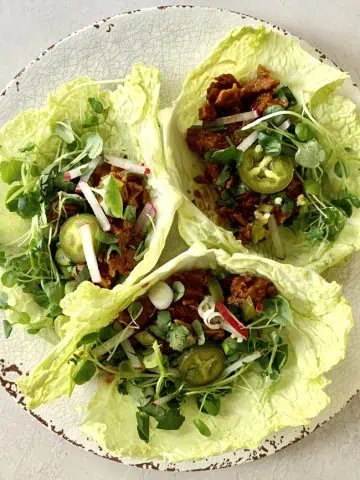


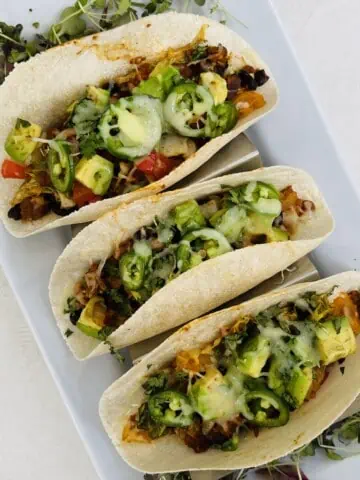

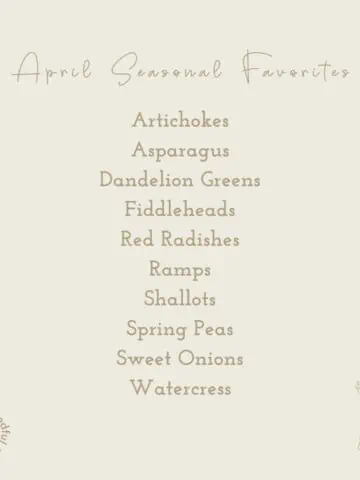

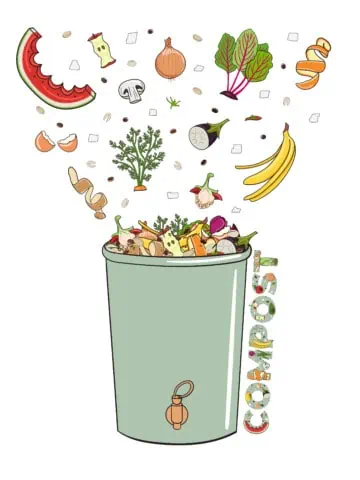
Leave a Reply